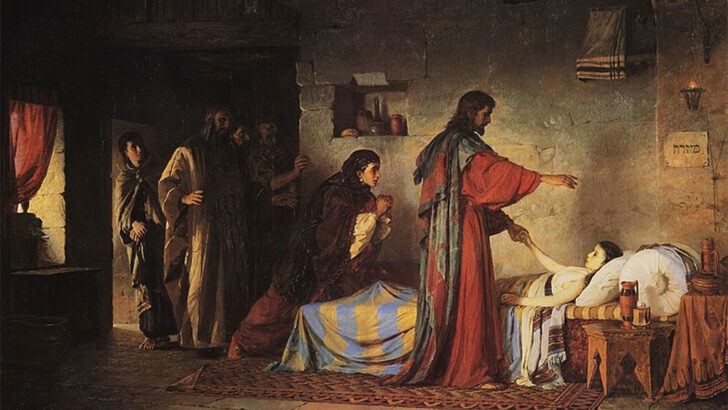The Sunday Gospel
Wis 1:13-15; 2:23-24
Ps 30:2, 4, 5-6, 11, 12, 13
2 Cor 8:7, 9, 13-15
Mk 5:21-43 or 5:21-24, 35b-43
Deep below the outskirts of Rome is a vast network of underground tunnels and chambers, known as the Roman catacombs. There, the early Christians made burial spaces outside the city walls where they could pray for their loved ones and celebrate the Eucharist. On the catacomb walls they expressed their Faith in vivid paintings of scenes from the Old and New Testaments.
Healing
Among the biblical scenes painted on the walls of the ancient Catacombs of Marcellinus and Peter is the healing story recounted in today’s Gospel. Such images tell us that Jesus’ healings had a profound impact on the first Christian community, born at Pentecost.
Throughout his earthly life, Jesus showed a ‘preferential love for the sick’, as he encountered people with various illnesses who sought healing from God. As the Catechism notes, “moved by so much suffering Christ not only allows himself to be touched by the sick, but he makes their miseries his own: ‘He took our infirmities and bore our diseases’” (CCC, No. 1505).
Two healing miracles are recounted in today’s Gospel as one story unfolds within another. Mark tells us that a large crowd followed Jesus seeking his wisdom and healing power. Then a synagogue official, named Jairus, pleaded with Jesus to lay his hands on his daughter who was dying from illness.
Daughter, your Faith has saved you. Go in peace and be cured of your affliction”
As Jesus accompanied Jarius to his home another healing unfolded on the way. A woman, suffering for many years from haemorrhages, heard about Jesus and approached him in the crowd to touch his cloak. To suffer from haemorrhages meant that the woman was ritually unclean and therefore isolated and ostracised from her community. Her physical suffering resulted in spiritual suffering from social and emotional alienation.
Throughout his earthly life, Jesus showed a ‘preferential love for the sick’, as he encountered people with various illnesses who sought healing from God”
At the touch of Jesus’ cloak, the woman is healed. And we might wonder why Jesus asks, “who touched my clothes,” in the midst of a pressing crowd. Jesus’ healing is not a manifestation of raw spiritual power but an expression of divine love and friendship. Jesus desires that the woman recognise the gift of Faith that she received along with the gift of physical healing. One without the other leads to superstition and irrational beliefs.
Jesus’ personal encounter with the woman ensures that her experience of his healing touch is rooted in a freely chosen act of Faith. So, Jesus says to her, “Daughter, your Faith has saved you. Go in peace and be cured of your affliction.”
Faith
Jesus continued on to Jairus’ house only to learn that his daughter had died. Once again we see that Jesus desires that this moment of crisis become a moment of deep Faith. So, Jesus encourages the distraught father with these comforting words, “Do not be afraid; just have faith.” When he arrived at the house, he took the child by the hand and said to her, “Talitha koum,” which means, ‘Little girl, I say to you, arise!’
They were confident that Jesus’ presence and words could heal and restore in a way that only God can”
Mark tells us only that the family and crowds were astounded as the 12-year-old girl arose immediately and walked around.
Both the synagogue official and the woman with haemorrhages had deep Faith. They were confident that Jesus’ presence and words could heal and restore in a way that only God can. For only God can raise the dead to life and restore and heal physical and spiritual wounds. May we deepen our faith in Jesus’ desire to heal as we pray, “speak to me, Lord.”
Her physical suffering resulted in spiritual suffering from social and emotional alienation”
Question: How have you encountered Jesus’ healing love in the sacraments of the Church?
Jem Sullivan holds a doctorate in religious education and is an associate professor of catechetics in the School of Theology and Religious Studies at The Catholic University of America in Washington.


 Voskreshenie docheri Iaira (1871) by Vasiliy Polenov. Photo: Wikimedia Commons
Voskreshenie docheri Iaira (1871) by Vasiliy Polenov. Photo: Wikimedia Commons 